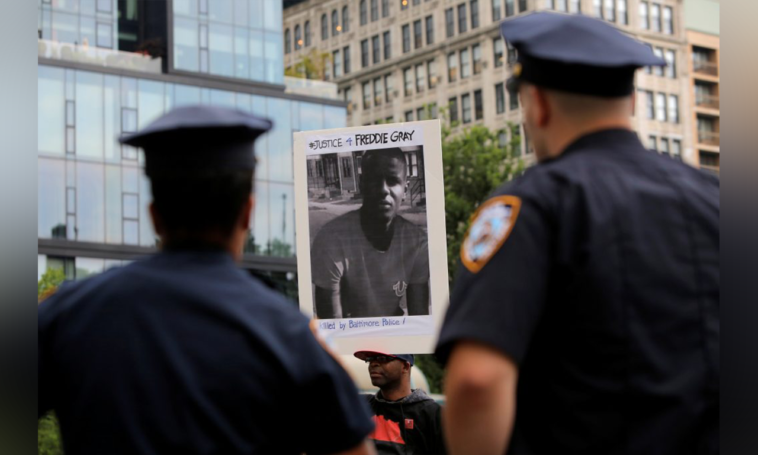The DOJ revealed on Tuesday that the Baltimore Police Department (BPD) has been complying with its federal consent decree since Freddie Gray’s 2015 in-custody death.
The DOJ’s announcement and Tuesday’s move suggested the BPD might be removed from the consent decree if it follows the 2017 agreement.
“Since approval of the consent decree, BPD has overhauled its fleet of transportation vehicles, safety equipment, data collection mechanisms, policies, and training.” US Department of Justice
“BPD now closely tracks information about all transports, including detainee injuries, and during the 17-month period assessed by the court-appointed independent monitor, there were only 11 reported injuries during over 16,000 transports.”
The DOJ’s Civil Rights Division assistant attorney general, Kristen Clarke, said, “We are pleased the Baltimore Police Department has successfully implemented the reforms needed to safely transport detainees in its custody.”
In response to a damning 2016 DOJ report, Baltimore signed the consent decree in April 2017 to reform policing, including community monitoring and retraining. The investigation revealed BPD racial bias and disproportionate force, notably constitutional rights breaches against Black residents through unlawful searches, arrests, and discrimination.
Riots and Black Lives Matter protests followed Freddie Gray’s death. Gray, 25, died after a week-long coma from spinal cord injuries in a police van. The six officers charged with Gray’s death were acquitted.
Despite the absence of prosecutions, the DOJ’s announcement underlines BPD reform’s accomplishment. The 2017 consent decree allowed for vehicle overhauls, safety equipment, data collecting, policies, and training enhancements.
The DOJ noted particular successes. “BPD now closely tracks information about all transports, including any injuries suffered by detainees, and during the 17-month period assessed by the court-appointed independent monitor, there were only 11 reported injuries during over 16,000 transports.”
The DOJ’s latest statement recognizes the BPD’s work in addressing Baltimore’s Black community’s historical issues. The consent agreement created constitutional, fair, and nondiscriminatory policing and sought to right previous wrongs.
The DOJ’s good review marks a major change in the BPD’s pervasive racial bias and excessive force. After Gray’s death, the consent decree pledged to fix institutional shortcomings that had damaged Baltimore’s Black community’s trust.
While reform has been difficult, the DOJ’s latest acceptance may be a turning point for the BPD. The court-appointed independent monitor found only 11 injuries in over 16,000 transportation over 17 months, proving the measures worked.
According to the consent agreement, the city’s community supervision and retraining have made policing safer and more accountable. Kristen Clarke said, ” The Justice Department will engage with the Baltimore Police Department and community to provide constitutional, fair, and nondiscriminatory policing to all Baltimore residents.”
This also illuminates the US police reform debate. The Baltimore case shows how federal assistance and law enforcement initiatives can improve police. The DOJ’s oversight of reforms shows the federal government’s commitment to civil rights and law enforcement accountability.
As the BPD continues to comply, there is hope that it can exit the consent decree and usher in a new era of Baltimore policing. The city’s Black community has long sought justice, openness, and legal equality
In conclusion, the DOJ’s declaration is a major step toward Baltimore Police Department reform. The dedication to fixing previous mistakes and establishing constitutional and impartial policing sets a precedence for other law enforcement agencies facing similar issues. The DOJ’s recognition of the BPD’s progress gives Baltimore hope for a more just and equitable future and contributes to the national conversation about police reform.



One Comment
Leave a ReplyOne Ping
Pingback:Manny Ellis’ Death Sparks Proposal To Ban Cops From Hog-Tying People
Join the Community and Be a Part of the Conversation
You must be logged in or registered to post a comment.